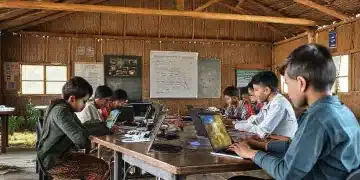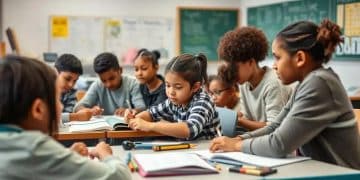New standards for early childhood educators in 2023

Anúncios
New standards for early childhood educators focus on enhancing teaching practices through family engagement, professional development, and community collaboration to create supportive learning environments for children.
New standards for early childhood educators are changing the landscape of young education. Have you ever wondered how these changes can improve teaching methods and outcomes for children? Let’s dive into what this means for educators today.
Anúncios
Understanding the new standards framework
Understanding the new standards framework for early childhood education is essential for every educator. This framework is designed to ensure that all children receive the best possible start in their educational journey.
The framework emphasizes several key components that are crucial for early learning environments. These components help educators align their teaching practices with the goals set forth by the new standards.
Anúncios
Key Components of the Framework
Educators must focus on these vital aspects:
- Developmentally Appropriate Practices: Teaching methods should match the psychological and physical development stages of children.
- Inclusive Education: All children, regardless of their backgrounds or abilities, should feel welcomed and supported in the classroom.
- Family Engagement: Collaborating with families is critical for supporting children’s learning and development.
- Assessment Standards: Regular assessments should guide instruction and provide insight into each child’s progress.
By focusing on these critical areas, teachers can effectively implement the new standards. Moreover, understanding these components allows educators to create a nurturing environment that fosters growth.
It’s also crucial for educators to continuously enhance their skills and knowledge to keep pace with these evolving standards. Professional development opportunities play a significant role in this process, ensuring that teachers are well-equipped to meet the needs of their students.
Additionally, the collaboration among educators, administrators, and families creates a supportive network. This network is essential for sharing effective strategies and resources that benefit all children.
Ultimately, the new standards framework serves as a guide, helping educators shape a positive learning experience for every child. By embracing these standards, educators contribute to the overall improvement of early childhood education.
Practical applications in early childhood settings

Practical applications of the new standards in early childhood settings are vital for effective teaching. By implementing these standards, educators can enhance the learning experiences of young children.
To apply these standards, educators can focus on creating engaging and interactive learning environments. This can include incorporating play-based learning, which not only aligns with developmental stages but also fosters creativity.
Strategies for Implementation
Here are some effective strategies for applying the new standards:
- Use of Interactive Learning Tools: Incorporate technology and hands-on materials that promote exploration.
- Adaptive Teaching Methods: Tailor your teaching style to meet the needs of diverse learners.
- Collaboration with Families: Involve parents in the learning process to boost child development.
- Focus on Social-Emotional Learning: Encourage activities that promote emotional intelligence and social skills.
These strategies help create a supportive environment that encourages growth. For instance, when children engage in cooperative play, they learn valuable social skills. This practice also supports the new standards by promoting collaboration and communication.
Additionally, regular assessments can guide educators in adjusting their practices. By observing children, educators can determine which activities are most effective in promoting learning. Such assessments should be ongoing and help inform families about their children’s progress.
Implementing the new standards also requires educators to reflect on their practices regularly. This can lead to professional development opportunities that enhance their skills in line with the latest educational approaches.
Fostering a community of practice among staff can also enhance the application of these standards. When educators share experiences and methods, they collectively build a more effective learning environment.
Supporting educator development and training
Supporting educator development and training is essential for implementing the new standards in early childhood education. Continuous learning enables educators to stay updated on best practices and effectively meet the diverse needs of children.
Professional development can take many forms, from workshops to online courses. It is vital for educators to engage in this training to enhance their skills and incorporate innovative teaching methods.
Types of Training Opportunities
Here are some training opportunities that can support educators:
- Workshops and Seminars: These provide hands-on experiences and allow educators to learn from experts in the field.
- Online Courses: Flexible options that educators can complete at their own pace, covering various topics related to early childhood education.
- Coaching and Mentorship: Pairing less experienced educators with mentors helps them gain practical insights and support.
- Peer Collaboration: Opportunities for educators to share experiences and strategies can strengthen their teaching practices.
By participating in these opportunities, educators can better support children’s growth and development. Engaged educators create learning environments that foster creativity, critical thinking, and social skills.
Moreover, training should focus on the importance of emotional and social learning. This aspect prepares educators to address children’s emotional needs effectively, creating a nurturing environment that promotes well-being. Integrating social-emotional learning into training ensures that educators recognize the whole child’s development.
Reflective practice is also crucial in educator development. Educators should regularly assess their teaching effectiveness, consider feedback, and adapt their methods accordingly. This process fosters a growth mindset and encourages ongoing improvement.
Building a positive culture of professional development within educational institutions can significantly impact how educators feel about their roles. When schools prioritize and invest in teacher training, it enhances job satisfaction and retention while benefiting children.
Engaging families and communities effectively

Engaging families and communities effectively is a crucial part of implementing the new standards in early childhood education. When families are involved, children tend to thrive. A strong partnership between educators and families can create a supportive network that enhances learning.
To foster this collaboration, educators should establish open lines of communication with families. Regular updates through newsletters, emails, or social media can keep parents informed about their child’s progress and classroom activities.
Strategies for Family Engagement
Here are some effective strategies for engaging families and communities:
- Hosting Workshops: Organizing workshops that educate parents about early childhood development and the new standards can empower them to support their children at home.
- Involvement in Activities: Encouraging families to participate in classroom events or volunteer can strengthen their connection to the school community.
- Creating Resource Centers: Providing materials and resources that families can use at home enhances learning experiences outside the classroom.
- Gathering Feedback: Actively seeking input from families on school initiatives or programs fosters trust and collaboration.
Additionally, building relationships with community organizations can provide further support. Partnering with local libraries, health services, and recreational centers can offer families additional resources, benefiting children’s overall development.
When families feel welcomed and included, they are more likely to engage in their child’s education. This involvement boosts children’s confidence, encouraging them to succeed academically and socially.
Effective engagement also recognizes the diversity within families and communities. Educators should adapt their strategies to be culturally sensitive, ensuring that every family feels represented and valued. Personalized approaches can help bridge gaps between cultures and enhance understanding.
By prioritizing family and community involvement, educators create an enriched environment that supports the new standards, fostering a holistic approach to early childhood education.
FAQ – Frequently Asked Questions about New Standards for Early Childhood Educators
Why is family engagement important in early childhood education?
Family engagement supports children’s learning and well-being, creating a collaborative environment that enhances their educational experience.
What are effective strategies for engaging families?
Hosting workshops, inviting families to participate in classroom activities, and maintaining open communication are effective strategies for engagement.
How can educators continue their professional development?
Educators can pursue workshops, online courses, and mentorship opportunities to enhance their skills and adapt to new teaching standards.
What role do community partnerships play in education?
Community partnerships provide valuable resources and support, enriching the educational experience for children and their families.





